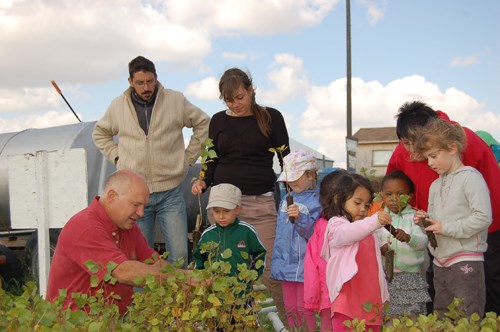HELP International was home to 17 interns this year and 16 environmental research projects. Their home, however, is in jeopardy as the City of Weyburn has decided it cannot extend HELP's lease beyond October 31, 2014.
"Tax payers aren't getting market value for that property," explained Manager of Community Services Doug Mulhall.
HELP currently pays $1 per year on the nine-acre City parcel on Queen Street, known as the City Farm, it is immediately west of the former Souris Valley Hospital site.
CEO of HELP International Rodney Sidloski came to the City Council meeting on October 12 to explain to Council what sort of work is happening at HELP and to try to sway them to reconsider their decision.
Sidloski highlighted some of HELP's recent successes, including making 220,000 plastic mulch tree pads out of grain bags.
"Forty-five grain bags were recycled this year," said Sidloski. "We saved 6,000 kilograms of plastic that would have been burned in the Weyburn locality, instead, it was recycled."
Sidloski reminded Council that the City has banned grain bags from the landfill and that his recycling program is the first in Saskatchewan.
Sidloski also explained that HELP is the only Styrofoam recycling facility in town and that businesses, such as Weimer's Hometown Furniture and Sears, and individuals have been bringing their Styrofoam products to HELP regularly.
"Most of our focus this year was on forestry research and horticultural research," Sidloski told Council.
He went on to show Council examples of HELP's forestry research, displaying a tree plug grown with select species of grass plants. Sidloski said the preferred grass plants, or weeds, will grow with the tree and make it difficult for other, moisture-hungry weeds to take over the tree seedling.
Sidloski highlighted another research project carried out this year at HELP with a forestry engineer from Spain. HELP is testing the ability of select varieties of poplar trees to metabolize soils contaminated by oil spills to determine the rate trees can remove oil from soil and at what point the oil becomes toxic to the trees.
Spanish researcher David Lasala began this project at HELP this summer by planting tree seedlings in 20-litre pails and contaminating the pails with measured amounts of oil.
Lasala explained in a previous interview that the research had many applications for the oil industry, namely, planting trees as a preventative measure in areas where soil contamination is a potential threat.
Lasala said the research would need a full year before results could be studied. He returned to Spain a few weeks ago, leaving his reasearch in the hands of HELP.
One of HELP's most exciting projects, according to Sidloski, is their super-root tomato plant, which had a whopping 90 tomatoes on their best producing plants. Members of the Weyburn Horticultural Society have been assisting HELP with this research.
Despite the presentation, Council was determined to regain the land in 2014, citing future development of the area as their reason.
Sidloski had initially requested to purchase the land or extend the lease to 30 years, both requests, however, were denied. He also wanted permission from the City to move two cabins onto the property for temporary office space and accommodations for interns, before 2014.
"Your request for a 30-year lease or purchase has been denied," Mayor Debra Button told Sidloski during the meeting. "We are not interested in having any more temporary buildings on the property."
Button pointed out that are already a number of buildings on the property slated for removal by HELP in 2014. She explained that the future development of the Souris Valley area may make HELP's current land very valuable to the City, and they could not continue to let it be occupied indefinitely while plans for the area are being made.
Sidloski said that it was his understanding that the lease would be indefinite, provided HELP didn't change the use of the site.
City Manager Bob Smith interjected, stating that the City's intention was to assist HELP start their operations at their current location in 2002 and that the site was never meant to be a permanent location.
The City has been assisting HELP since 1999 when they allowed them to set up a mock African Village on the lot at the corner of Souris Avenue and Second Street. When this lease ran out, the City found HELP's current site for them.
After the meeting, Sidloski said he was disappointed with Council's decision but said it won't diminish HELP's programming.
"We want to be positive," said Sidloski. "That's what makes us do what we do."
"HELP is a culture of hope for young people that want to fix the environment. It's a culture of hope for those who want to make a better world. We want to keep that as being the spirit that we operate by."




